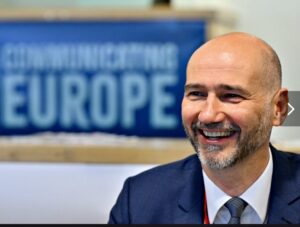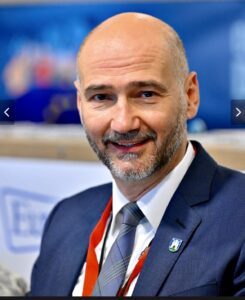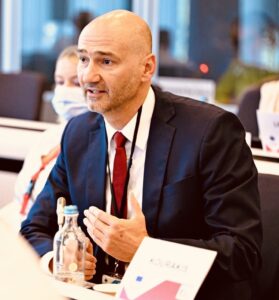Development and progress of the City depends primarily on the behavior of the representatives, not on their political views.
Joško Klisović, President of the Assembly of the City of Zagreb, states for Diplomacy&Commerce that they will work intensively and change things at the City Assembly, because professional strengthening of clubs of representatives and the provision of all legal, statutory and operational conditions for the establishment of the Secretariat of the Assembly, which would be separate from the executive power, i.e. the Mayor, which is not the case now. He believes that business people can best contribute to development of the state and society by following the principles of corporate social responsibility and supporting the personal development and education of their employees and young people in general.

- You are at the head of the Zagreb City Assembly. What are you most proud of from what has been done since you became in charge, and what would you change in your work?
Change in the Rules of Procedure of the City Assembly is one of the things that I am proud of and which significantly improved the work of the Assembly during my mandate. Deputies are now more focused on the agenda items on which we have to make decisions in order to regulate the situation in the city and ensure a better life for its citizens. Debates are now of higher quality and more concentrated, and the space for manipulation of the procedure for personal political promotion of individual representatives and senseless political calculations without any value for citizens has been reduced. I also intensified international cooperation, which, in addition to the exchange of useful experiences and ideas and the education of representatives, resulted in a donation of half a million HRK for the reconstruction of the European cinema, help in clearing the city of fallen trees and faster repair of the damage caused by the worst storm in the history of Zagreb, new financing opportunities for Zagreb projects through the Development Bank of the Council of Europe, etc. I will continue with initiatives and proposing decisions to the Assembly as before for a better quality of life for citizens.
- What are the most common problems you face at work and how do you solve them? How much politics “holds back” development and progress?
A great deal of problems stems from inadequate legal framework in which we operate. In this sense, as I mentioned, the Secretariat of the Assembly should be restored and thus complete the institution of the Assembly for the professional preparation of its legislative work. Both the ruling party and the opposition are aware of this, but we have not moved much because the competent Ministry of Justice and Administration is not ready to amend the Law on the City of Zagreb in this way. Politics is an integral part of parliamentary work, so our efficiency and speed of decision-making, and thus the development and progress of the City, depends primarily on the behavior of the representatives, not on their political views.

- You are currently the head of the Assembly of the capital and largest city in Croatia, but you have also been involved in diplomacy. You were deputy to Minister of Foreign and European Affairs Vesna Pusić and a diplomat who lived in New York and Brussels. What is the biggest difference in doing these two jobs?
They certainly have one thing in common – you represent the interests of the citizens of your country and your city. What differs are the topics you deal with. In the City, communal topics are dominant, while there are none of these in diplomacy. However, the cities are intensively developing the so-called “city diplomacy”, where my experience in diplomacy is extremely beneficial in my work and representation of Zagreb in the European Committee of the Regions.
- What would you single out as the most important points of work in diplomacy and how do you rate the work of Croatian diplomacy at the moment in the circumstances as they are? How important is intercity diplomacy?
The greatest successes of our diplomacy are the international recognition of the state and the successful conduct of negotiations within the framework of the conference on the former Yugoslavia, the peaceful reintegration of Podunavlje and the diplomatic preparation of liberation actions in the Homeland War, admission to NATO and the EU, and the development of economic diplomacy. I worked on all these state priorities and I am particularly proud of that. Today’s diplomacy is trying, but it lacks clearly defined foreign policy goals, so as a result, meaningful initiatives are also lacking. Inter-city diplomacy is extremely important, especially in the European context, considering that 85% of the Acquis is implemented at the local level, and the voice of the cities is not heard enough in the preparation and definition of European policies. That is why the European Committee of the Regions was established. In addition, city diplomacy is important in the exchange of experience in managing communal issues and the process of digitization, energy and green transition, and overall modernization, and in the event of an accident, help arrives the fastest from cities with which you have established “diplomatic” cooperation.

- Politics, diplomacy, it seems that the natural piece of the puzzle that’s missing is the business. You are currently volunteering at the head of the Assembly. What is the reason for this?
I recently switched from a professional to a volunteer status of the President of the Assembly because I wanted to remove the issue of my salary from the agenda in my own party and return the party’s focus to the discussion of proposals and initiatives for a better life of citizens. Former presidents of the Assembly from SDP also received a salary, but this was not an issue at the time. I found a job in the private sector in a company that showed understanding for my obligations as President of the Assembly.
- Connection between business and politics is natural and inevitable. In your opinion, what should the politicians do to improve the economic environment, in addition to passing laws, and how can business people contribute to the development of society and the state without only material interest and profit?
Politicians should primarily ensure a quick solution to the requests of entrepreneurs and thereby improve the business climate. In this sense, I will go with the One-Stop-Shop proposal at the next session of the Assembly. The idea is that entrepreneurs who now go from one city office to another have one place to turn to and where they will get everything they need, OSS will coordinate all competent city offices. Business people can best contribute to the development of the state and society by following the principles of corporate social responsibility and supporting the personal development and education of their employees and young people in general. Public-private partnership, sponsorships and donations for quality public and non-governmental projects are always welcome.
- Where do you see yourself in 5 years, and how do you see the Croatian society in this period?
I see Croatia in five years as a country that is starting to change the established patterns of behavior that have brought us to such low branches. A country where pre-election promises are starting to be implemented, where laws are passed according to citizens, not interest groups. A country where institutions work in the public interest according to the principles of good governance, a country led by the progressive left through digital, social and climate transition towards a society based on full respect for human rights and social justice. I will be active, as before, and I will use my work and life experience to contribute to the betterment of our society through the public or private sector.